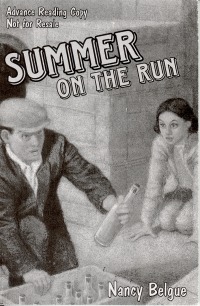| ________________
CM . . .
. Volume XI Number 20 . . . . June 10, 2005
excerpt:
Poverty, prohibition, and a fast paced plot drive the reader quickly through this historical fiction adventure. Set in Windsor in 1931, the story is rich with the innumerable struggles faced by many families during this challenging time in history. The Stanleys are no different. Mr. Stanley abandoned the family a year earlier, but Doris, Douglas, and their mother have remained in Windsor on their own trying to squeeze out an existence. Although written in the third person, the events are seen through the eyes of Doris, the 10-year-old younger sister to 13-year-old Douglas. Doris is a responsible, realistic little girl who strives to keep Douglas from getting into trouble. She is not very successful, though, as Douglas begins to smuggle rum across the United States border to support the family. He is not a very good smuggler, and the police are soon after him. Douglas becomes a fugitive, and to avoid him being caught, the family decide to leave the city and camp at Point Pelee for the summer. The Stanleys become "squatters" and enjoy the time in the wilderness until their mother begins to make arrangements for them to resettle in Alberta with her estranged father. Douglas decides he must find their missing dad to prevent the family's move west, and Doris secretly follows Douglas on the hunt. The story wraps up neatly with the two children finding their father and the family being reunited. All four of the Stanleys decide to move to Alberta to start a new life with Mrs. Stanley's relatives. Belgue grabs the reader's attention quickly as the book opens with a school-yard fight on the last day of school. The dialogue rings true and moves the plot along effectively. Belgue does include some unnecessary information which may momentarily confuse the reader, but the easy-to-read print, realistic characters, and the background notes all help to improve the reader's understanding of this far off time of prohibition and the Depression. There is an interesting contrast between the brother and sister in this novel. Douglas is the quick-thinking dreamer who is impulsive and sees no obstacles. Doris, on the other hand, plans for the future and tries to serve as her brother's guardian angel. She strives to be tough and loyal to the Stanley name, but she constantly searches for four leaf clovers to bring her luck and keep her family safe. Doris has been nick-named the W.A.D., "word a day" girl by her classmates because of her insatiable appetite for learning and using new vocabulary on a daily basis. This quirky characteristic adds to the richness of the text as Doris tries to use her new words in different contexts. The central themes of this book are family, poverty, and adventure as well as the social studies connections to Canadian history. Students who enjoy the "Canadian Girls" series will enjoy this more challenging read. Because it is written in the third person and Douglas is such a strong character, boys will also enjoy reading this book. Always on the edge of a crises, the reader is drawn into the risky behaviour of Douglas Stanley. Summer on the Run keeps the reader guessing how this family will overcome its difficulties. The unique sibling relationship and the happy ending are appealing for middle-years students. All Doris' superstitions and worries pay off and entertain the reader throughout the story. Summer on the Run is an interesting historical fiction novel, and it is well-worth adding to any library collection. Recommended. Tanus Tosh McNeill is a teacher-librarian at Van Walleghem School in Winnipeg, MB.
To comment
on this title or this review, send mail to cm@umanitoba.ca.
Copyright © the Manitoba Library Association. Reproduction for personal
use is permitted only if this copyright notice is maintained. Any
other reproduction is prohibited without permission.
NEXT REVIEW
|TABLE OF CONTENTS FOR THIS ISSUE
- June 10, 2005.
AUTHORS
| TITLES | MEDIA REVIEWS
| PROFILES
| BACK ISSUES
| SEARCH | CMARCHIVE
| HOME |
